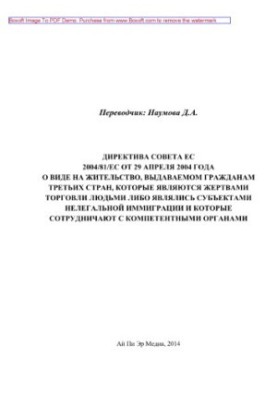Council Directive 2004/81/EC of 29 April 2004 on residence permits issued to third-country nationals who
 Instant download
Instant download
after payment (24/7)
 Wide range of formats
Wide range of formats
(for all gadgets)
 Full book
Full book
(including for Apple and Android)
The EU Council Directive 2004/81/EC of 29 April 2004 on residence permits issued to third-country nationals who are" is an important and up-to-date document that highlights key aspects of the European Union's migration policy. This work, created by a team of authors, not only brings together legal norms, but also offers an in-depth analysis of their application and impact on the lives of millions of people. This Directive concerns the granting of residence permits to third-country nationals who are victims of trafficking in persons or who are otherwise vulnerable. The book discusses in detail the conditions under which such citizens can obtain protection and legal status in the EU countries. This makes the text particularly important for lawyers, social workers, researchers and anyone interested in migration and human rights issues. The book will be of interest to a wide range of readers: from law students to practitioners working in the field of migration law. It can also attract the attention of activists and non-governmental organizations working to protect the rights of migrants. The importance of the topic covered in the book will not leave indifferent those who just want to better understand how the migration system works in Europe. The topics raised in the book concern not only legal aspects, but also the social, economic and cultural consequences of migration. The authors emphasize that migration is not only a legal problem, but also a matter of humanitarian responsibility. In the context of globalization and the increasing number of migrants, understanding these aspects becomes especially relevant. The book helps the reader to realize that behind the legal terms are the real destinies of people who are looking for protection and the opportunity to start a new life. The style of the authors is distinguished by clarity and accessibility, which allows even those who are not experts in the field of law to easily assimilate the material presented. They use examples from practice and real stories, which makes reading not only informative, but also emotionally rich. This allows the reader not only to learn about the directive, but also to empathize with those who find themselves in a difficult situation. The EU Council Directive 2004/81/EC can also serve as a basis for further research and discussion on migration policy in Europe. It raises important questions about how states should respond to migration challenges and the role international norms and agreements play in this process. Readers interested in human rights, social justice and migration will find in this book a lot of useful information and ideas for reflection. Thus, the EU Council Directive 2004/81/EC of 29 April 2004 on residence permits issued to third-country nationals is not just a legal document, but an important contribution to understanding the complex and multifaceted problem of migration. The book will be a useful resource for anyone who wants a deeper understanding of how legislation can help or, conversely, complicate the lives of those seeking protection and new opportunities in Europe.
LF/555778077/R
Data sheet
- Name of the Author
- Collective of authors
- Language
- Russian
- Release date
- 2017


























